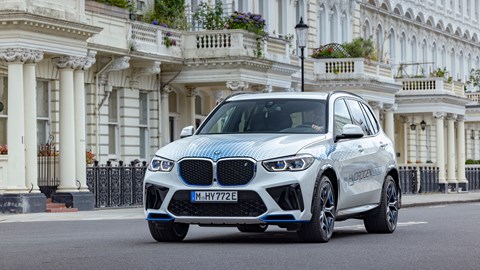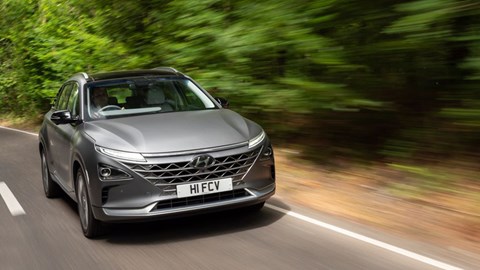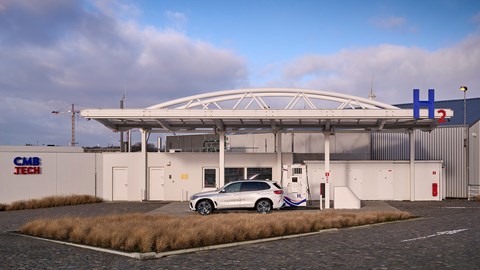► Hydrogen cars are available to buy but in very small numbers
► Very poor refuelling infrastructure, so issues to tackle
► Will there be more hydrogen cars in the future?
For the last 20 or so years, hydrogen power has been spoken of as a potential future for the car, but its adoption into the mainstream has never materialised.
Going green is top of the agenda for car manufacturers right now, and turning to hydrogen seems an alluring prospect. It’s abundant, safe for the environment when properly used and, thanks to some clever engineering, can be topped up as quickly as one would at a petrol or diesel pump.
But all the perks aside, its development has been slow and vastly upstaged by the advent of the battery-powered electric vehicle, commonly referred to as the EV.
Slow progress notwithstanding, there have been a few mass-produced hydrogen-powered cars, including a very, very small number that made it to the UK. The number is almost incomprehensibly dwarfed by the number of EVs on UK roads today, but say you want to defy convention, upset the paradigm and rage against the electric machines. Can you actually buy a hydrogen car?
First, how hydrogen-powered cars work
Hydrogen-powered cars are similar in design to conventional EVs as they both use electric motors to drive the wheels.

However, while EVs deploy stored electricity from a battery to power the electric motors, the fuel cell stacks in hydrogen cars produce electricity on the go through a chemical reaction between hydrogen and oxygen. That electricity then either powers the car directly or is stored in a smaller battery until needed.
It’s by virtue of this design that hydrogen-powered cars are often referred to as fuel cell electric vehicles (FCEVs)
Can I buy a hydrogen car?
In short, yes you can, but though a few more manufacturers have been testing hydrogen power recently, there are currently only two hydrogen cars on sale in the UK today: the Toyota Mirai and Hyundai Nexo.
The Toyota Mirai has been around for almost 10 years now and is the first mass-produced FCEV. The current model – the Mirai’s second generation – went into production in 2020 and surpasses the previous generation in both range and power. It now produces 182hp from a hydrogen fuel cell-powered electric motor and has a claimed range of 402 miles with the tanks brimmed.

The Hyundai Nexo first arrived in the UK in March 2019. This compact crossover is also driven by an electric motor with electricity produced by a hydrogen fuel cell. It has a power output of 120 kW (160hp) and a claimed range of 414 miles. though would-be trendsetters be warned: changing the tide doesn’t come cheap as the Mirai and the Nexo cost up to £64,000 and £69,000 respectively.
Will there be more hydrogen cars?
It seems likely that there will be more hydrogen-powered cars on sale in the future. Just recently, hydrogen-powered concept cars were unveiled by BMW and Renault – the iX5 Hydrogen and the Renault Scenic Vision respectively.
The two are indicative of both manufacturers’ commitment, along with the already established leaders of the field, Hyundai and Toyota to develop this type of fuel, even if not for the passenger car market.
More locally, British manufacturer Riversimple has been developing its concept car, the Rasa – an FCEV with a claimed range of 300 miles on just 1.5kg of hydrogen and set to enter production soon.
Should I buy a hydrogen car?
This is the big one. You could buy a hydrogen car if you wanted one, but they come laden with caveats you should be aware of first.

Since there are so few FCEVs on UK roads, there are only a handful – and we really mean a handful – of stations to fill your hydrogen gas tanks. There were 15 hydrogen filling stations in the UK in 2021, but due to dwindling demand, today, there are only five open to cars.
So, thanks to an extremely limited number of refuelling stations, FCEVs come with an intrinsic element of risk. For anyone who lives outside of west London, Sheffield or Aberdeen, owning a hydrogen-powered car doesn’t make any sense. Even if you do live within those areas and decide to invest in an FCEV, we recommend planning each trip very carefully.
Lack of refuelling stations notwithstanding, if you really fancy a piece of the (possible) future today, there are FCEV waiting lists open right now.
Seth Walton is a staff writer on Bauer’s digital automotive hub. He specializes in motoring advice and other ownership content for CAR and Parkers, but has also taken to car accessory reviews as a former member of the Bauer affiliate team. He enjoys historic racing and has an affinity with old Ferraris, though he doesn’t care much for those who drive them.